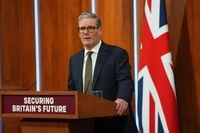The UK government has announced a substantial financial package aimed at supporting businesses affected by recent US tariffs, a move that is expected to help thousands of firms across the country. Up to £10 billion of this support will be directed specifically to those businesses impacted in the short term, according to the Treasury. Shadow Chancellor Rachel Reeves emphasized the importance of backing the UK’s world-leading businesses to navigate the challenges ahead, stating, "The world is changing, which is why it is more important than ever to back our world-leading businesses and support them to navigate the challenges ahead. Today’s announcement will do that just, with thousands of businesses right across the country set to benefit."
The announcement comes in the wake of former President Donald Trump's imposition of sweeping tariffs on imports to the United States, which has rattled the global economy, causing stock prices to tumble and raising fears of a recession. Following this, Trump has since reduced the tariff rates to 10% and exempted certain electronics, including smartphones and laptops, from the previous 145% charge on imports from China. The UK government remains hopeful for a deal to exempt the UK from these tariffs, with Reeves expressing her resolve to achieve "the best deal possible" for the nation.
However, a senior advisor to Trump indicated that such a deal might be unlikely, suggesting that the 10% tariff is now viewed as a "baseline". Reeves is set to continue negotiations for an economic deal with the US later this month during her attendance at the International Monetary Fund’s spring meetings in Washington.
In a column for the Observer newspaper, Reeves articulated her vision for a more balanced global economic and trading system aimed at bolstering national economies. She underscored the importance of free and fair trade while addressing the challenges posed by the current economic climate, acknowledging that Trump’s tariffs would have a profound impact on both the UK and global economies. "The Labour party is an internationalist party. We understand the benefits of free and fair trade and collaboration. Now is not the time to turn our backs on the world but to face forward," she wrote.
On the other hand, Conservative shadow business secretary Andrew Griffith criticized the Labour party for its perceived delays in securing an exemption from tariffs, arguing that British manufacturers are now facing higher costs and disrupted supply chains as a result of government decisions. He pointed out that under the Conservatives, significant groundwork had been laid for a US trade deal, citing eight state-level agreements and notable progress.
Meanwhile, the economic landscape is further complicated by the recent rise in the National Living Wage, which increased by 6.7% to £12.21 per hour as of April 1, 2025, for those aged 21 and over. This increase comes amid a £25 billion tax raid through higher employer National Insurance contributions, placing additional pressure on businesses across the UK. Simon Fraser, the owner of the Ben Reid Garden Centre in Aberdeen, voiced his struggles with the rising costs associated with staffing, stating, "We’re really struggling with one element of the ‘people’ bit: with the cost of it."
Fraser has had to make difficult decisions, including putting staff on short-term contracts, reducing hours, and laying off employees, such as the shop’s delivery driver. He expressed frustration about the burden of employment costs, saying, "We feel like with the payroll of six people, we’re employing a seventh who doesn’t exist." This sentiment resonates with many business owners who are grappling with soaring costs while trying to maintain their operations.
The minimum wage has been celebrated as a successful intervention for low-paid workers since its introduction in 1999, but the combination of rising wages and increased employment taxes is raising concerns about potential job losses this year. Paul Novak, the head of the Trades Union Congress, acknowledged the risk of underemployment, stating, "The headline increase in the minimum wage is no good if your employer cuts your hours in response, or if you are on a zero-hours contract where you don’t know from one week to the next how much you are going to be earning."
Data shows that the minimum wage has surged by 37% since 2021, significantly outpacing the 24% growth in average wages and the 23% increase in inflation during the same period. Neil Carberry from the Recruitment and Employment Federation highlighted the challenges facing employers who are already under strain from the pandemic and the recent tax changes. He noted, "The employers who are paying the minimum wage are the ones who are most affected by the big change in the National Insurance threshold."
Despite the low unemployment rates historically, the job market is showing signs of weakness, with the number of job seekers rising at the fastest pace since December 2020. This uptick is attributed to redundancies and a lack of available jobs, exacerbated by the uncertainties stemming from Trump’s trade war, which has caused many employers to delay investments and cut costs.
As a result, business owners like Fraser are hiring fewer people and cutting part-time jobs, leading to a more precarious employment landscape. The minimum wage, while beneficial for many workers, is now seen as a double-edged sword, with experts warning that it may be rising too quickly. The Institute for Fiscal Studies cautioned that there is little research on the implications of continuously increasing the minimum wage, stating, "It seems almost inevitable that there must be some level of the minimum wage that will lead companies to fire workers."
Fraser’s experience reflects the broader concerns of many business owners who feel overwhelmed by rising costs. He lamented, "We feel really hard done by the Government. We’re working more and more hours standing still. I haven’t had a pay rise for over eight years now."
As the government seeks to overhaul workers’ rights, including limiting zero-hour contracts and raising sick pay, the implications for the job market remain uncertain. Carberry warned that there is a risk of developing an "insider-outsider labour market" where those with jobs are treated well, but those seeking employment face increasing barriers.
In this complex economic environment, both the government’s support for businesses and the rising minimum wage present challenges that will need careful management to ensure that the UK’s economy remains resilient in the face of global pressures.





